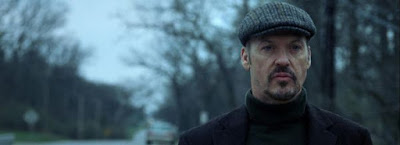Written at the time of the film's release.
"Know Thyself"*
or
"The Running Gag"
Vincent Mancini (Sam Rockwell) is conflicted, stymied, blocked, obstructed and stone-walled.
He is not, however, impotent.
He's a sex addict. He's half-heartedly going to a support group for sex mania. And whole-heartedly failing to commit...to the group's four-step program, or any serious relationship. In fact, every time he goes to one of the meetings he ends up taking a step or two back.
Understandable, as the group is full of sex maniacs!He works as a tour-guide at a historical reconstruction of a Revolutionary-period village ("I am the back-bone of Colonial America" he intones to the camera, as if he was reciting narration from "Fight Club"--the marketing for the film features that film's title in slightly smaller type than its own). There, he fantasizes about ripping the bodices off of every female employee. He wants to know them in the biblical sense, if not know them in the intimate sense.His mother (Anjelica Huston) is in a permanent care facility suffering from dementia, not from Alzheimer's, but from repeated and systematic drug use. She now only recognizes Vincent as one of a series of dead lawyers she once knew, which is fine, except that Vincent wants to know more about his past--specifically who his father is--and that knowledge is slowly fading from memory. Vincent is desperate to know that he has some DNA not related to his addled mother's.
His life is so abnormal, that he craves the normal even if he wouldn't recognize it if he was hit in the head with it. As a child he was jerked from foster-home to foster-home, always rescued by Mom, for a series of runs-to-the-border interrupted by arrest and another foster home. The only love he has known is when his mother saved him from choking on a corn-dog using the Heimlich maneuver. Now, he goes from restaurant to restaurant purposefully choking on food, in the hope that someone will rescue him. And give him some money out of sympathy to keep Mom in that facility.
The story so strains to be unconventionally amusing that it is crushingly disappointing to have it become so...conventional in its resolution and the embracing of the good and the normal as the panacea for all ills. Choke plays by the old bait and switch of the Hollywood system under the Hays Code. Lure the audience in with scandal, titillation and promises of lurid behavior, then turn it into a homily about the right, true path. Choke becomes the sort of sanctimony-in-wolf's-clothing that you would find in such films as Peyton Place, Sex and the Single Girl, or any horny teen sex-comedy, combined with the basic trope of psychological films where all one's neuroses are cured with a sudden remembrance of that one key event that unlocks all the symptoms, and you have the basic dull curve that Choke slides into. Everything falls like a house of cards once the underlying truth is revealed.**
One should expect more from the author of "Fight Club," but it's not his fault. Blame writer-director Clark Gregg for this one. He's taken all the thorns off of Palahniuk's outline and exposed the basic tawdriness of his novel to the light of day and making it shrivel like a vampire.***
The only thing to recommend this film is Rockwell and Huston, who manage to breathe life into their characters--they're the best written in the screenplay. Sensitive viewers should be aware of the pervasive language, and sexual situations, which are not glamorized in the least.
* Inscribed at the Temple of Apollo at Delphi. John Huston used it in the prologue for his film Freud: The Secret Passion, as the basic tenet of psychology. In the context of Choke, I find it a rather useful and funny reference.
** As in the other Palahniuk adaptation. It's interesting, the whole "falling house of cards" metaphor for the psychological scale falling from one's eyes can be applied (quite literally) to Fight Club as well, and it's just as much an oversimplification of the process as Choke, or for that matter, Freud, or Spellbound. It did clue me into the conclusion that Fight Club is a completely mentally-contained movie--that is, it's all happening in the main character's head. All of it. Or it doesn't make any sense. If that is the intention, my respect for the film just doubled. Maybe the scales fell from my eyes.
*** One more thing: Gregg joins the group of actor-creators not content to stay behind the camera of their films, ala M. Might Shyamalan, Mike Binder, and Kenneth Lonergan. The likes of Costner and Harris and Gibson act and direct because the producers cut their losses on actors' "special projects" by keeping their legitimate box-office draws up-front. There's no financial reasons that Shyamalan or Lonergan or Gregg should be splitting their attentions acting, and writing-directing. Hitchcock made cameos in his films initially to fill in crowd scenes, then it came to be expected--a running gag lasting throughout his career. Here the "Hitchcock moments" are merely self-serving.


















